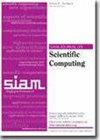The Sparse-Grid-Based Adaptive Spectral Koopman Method
IF 2.6
2区 数学
Q1 MATHEMATICS, APPLIED
引用次数: 0
Abstract
SIAM Journal on Scientific Computing, Volume 46, Issue 5, Page A2925-A2950, October 2024.Abstract. The adaptive spectral Koopman (ASK) method was introduced to numerically solve autonomous dynamical systems that laid the foundation for numerous applications across different fields in science and engineering. Although ASK achieves high accuracy, it is computationally more expensive for multidimensional systems compared with conventional time integration schemes like Runge–Kutta. In this work, we combine the sparse grid and ASK to accelerate the computation for multidimensional systems. This sparse-grid-based ASK (SASK) method uses the Smolyak structure to construct multidimensional collocation points as well as associated polynomials that are used to approximate eigenfunctions of the Koopman operator of the system. In this way, the number of collocation points is reduced compared with using the tensor product rule. We demonstrate that SASK can be used to solve ordinary differential equations (ODEs) and partial differential equations (PDEs) based on their semidiscrete forms. Numerical experiments are illustrated to compare the performance of SASK and state-of-the-art ODE solvers.
基于稀疏网格的自适应频谱库普曼方法
SIAM 科学计算期刊》,第 46 卷第 5 期,第 A2925-A2950 页,2024 年 10 月。 摘要。自适应谱库普曼(ASK)方法用于数值求解自主动力系统,为科学和工程领域的众多应用奠定了基础。虽然 ASK 实现了高精度,但与 Runge-Kutta 等传统时间积分方案相比,它对多维系统的计算成本较高。在这项工作中,我们将稀疏网格和 ASK 结合起来,以加速多维系统的计算。这种基于稀疏网格的 ASK(SASK)方法使用 Smolyak 结构来构建多维定位点以及相关多项式,这些多项式用于近似系统 Koopman 算子的特征函数。与使用张量乘积规则相比,这种方法减少了配准点的数量。我们证明 SASK 可用于求解基于半离散形式的常微分方程和偏微分方程。我们通过数值实验比较了 SASK 和最先进的 ODE 求解器的性能。
本文章由计算机程序翻译,如有差异,请以英文原文为准。
求助全文
约1分钟内获得全文
求助全文
来源期刊
CiteScore
5.50
自引率
3.20%
发文量
209
审稿时长
1 months
期刊介绍:
The purpose of SIAM Journal on Scientific Computing (SISC) is to advance computational methods for solving scientific and engineering problems.
SISC papers are classified into three categories:
1. Methods and Algorithms for Scientific Computing: Papers in this category may include theoretical analysis, provided that the relevance to applications in science and engineering is demonstrated. They should contain meaningful computational results and theoretical results or strong heuristics supporting the performance of new algorithms.
2. Computational Methods in Science and Engineering: Papers in this section will typically describe novel methodologies for solving a specific problem in computational science or engineering. They should contain enough information about the application to orient other computational scientists but should omit details of interest mainly to the applications specialist.
3. Software and High-Performance Computing: Papers in this category should concern the novel design and development of computational methods and high-quality software, parallel algorithms, high-performance computing issues, new architectures, data analysis, or visualization. The primary focus should be on computational methods that have potentially large impact for an important class of scientific or engineering problems.

 求助内容:
求助内容: 应助结果提醒方式:
应助结果提醒方式:


